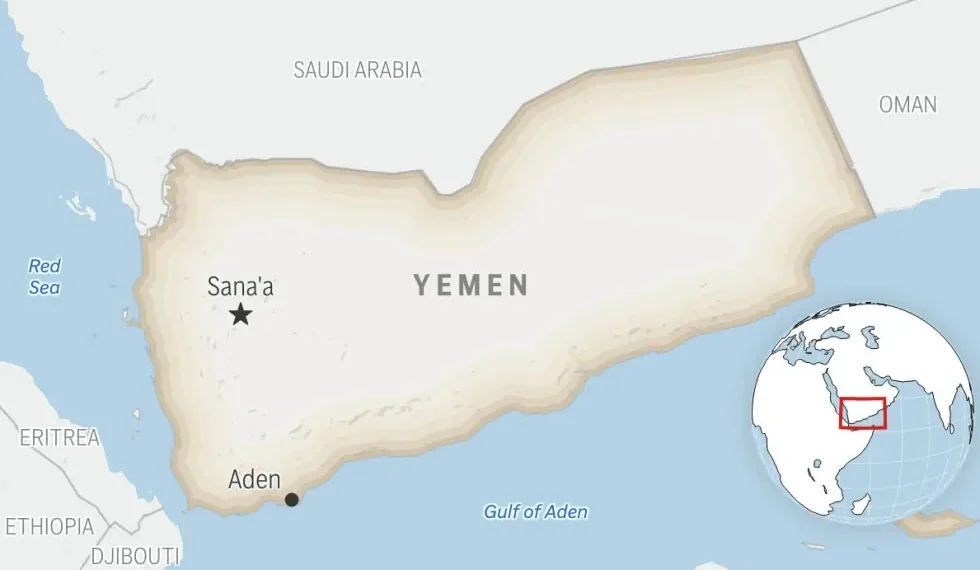A gas tanker sailing under the Cameroonian flag caught fire in the Gulf of Aden off Yemen, prompting its crew to abandon ship after an apparent explosion. One mariner remains missing, while international officials offer conflicting accounts of whether the blaze was caused by a missile strike or an accident.
Conflicting Reports on Cause of Explosion
Authorities remain divided on what triggered the fire aboard the vessel Falcon early Saturday. The United Kingdom Maritime Trade Operations (UKMTO) center reported that the ship “was hit by an unknown projectile,” while the European Union’s naval mission, Operation Aspides, described the fire as likely the result of an “accident.”
Both agencies warned that the ship, which was carrying liquefied petroleum gas (LPG), poses a significant risk of explosion. “The vessel is fully loaded and currently on fire,” said a UKMTO spokesperson. The organization advised nearby vessels to maintain a safe distance while investigations continue.
Rescue Efforts and Missing Crew Members
According to Operation Aspides, the Falcon carried a crew of 26 — all Indian nationals except for one Ukrainian. Most were successfully rescued, but one mariner remains unaccounted for, and another is believed to still be onboard the burning ship.
The Greek frigate HS Spetsai was dispatched to assist rescue operations, while French forces deployed an aircraft to survey the scene from above. The vessel was reported to be around 210 kilometers (130 miles) east of the Yemeni port city of Aden.
“Initial indications suggest that roughly 15% of the ship is on fire,” said the EU naval command. “At this stage, evidence points toward an accidental cause.”
Geopolitical Tensions Heighten Risk in Regional Waters
The incident occurs amid months of unrest in the Red Sea and Gulf of Aden, where Yemen’s Houthi rebels have targeted commercial vessels in what they claim are acts of solidarity with Palestinians in Gaza. The attacks have severely disrupted global shipping routes, forcing major carriers to reroute vessels around Africa’s Cape of Good Hope.
While the Houthis have not claimed responsibility for this particular fire, analysts note that the group often delays public statements about such operations by several hours or days. The UKMTO and regional observers continue to monitor rebel activity closely.
The Israeli military confirmed awareness of the incident but denied any involvement.
Falcon’s History and Alleged Links to Sanctioned Fleets
The Falcon has previously been associated with a shadow network of vessels believed to be circumventing international sanctions on Iran. According to United Against Nuclear Iran (UANI), a U.S.-based advocacy group, the tanker has been part of an Iranian “ghost fleet” transporting petroleum products illicitly through international waters.
The ship’s listed owners and operators, based in India, have not yet responded to media inquiries.
Ongoing Maritime Threats in the Red Sea Corridor
The latest event underscores ongoing maritime insecurity in one of the world’s busiest trade routes. Before the escalation of hostilities in Yemen, the Red Sea handled nearly $1 trillion in goods annually. Houthi attacks have since killed at least nine mariners and sunk four commercial ships, according to international monitoring groups.
The most recent Houthi-claimed strike, on September 29, targeted the Dutch-flagged cargo ship Minervagracht, killing one sailor and injuring another. Though a ceasefire was announced on October 10, rebel factions have continued to pose threats to shipping lanes and regional stability.
Growing Concerns Over Humanitarian and Security Impact
Beyond the maritime crisis, the Houthis have intensified their confrontations with Saudi Arabia and international organizations. In recent weeks, the group detained dozens of local employees working with the United Nations and other humanitarian agencies, accusing them—without evidence—of espionage. The U.N. and partner organizations have strongly denied the claims, calling for the immediate release of detained personnel.
Regional security analysts warn that escalating tensions could further endanger international maritime trade and humanitarian aid operations across Yemen.
Global Maritime Response and Security Coordination
The EU’s Operation Aspides and allied naval forces continue to coordinate surveillance and rescue missions in the region. Several NATO-aligned countries, including Greece, France, and the United Kingdom, have expanded their presence to safeguard commercial routes through the Bab el-Mandeb strait, a critical chokepoint linking the Red Sea and the Gulf of Aden.
Experts stress that even if the Falcon fire proves accidental, the event highlights the volatile conditions facing crews navigating these high-risk waters.
Conclusion
As investigations continue, maritime authorities urge caution for vessels transiting near Yemen’s southern coast. Whether caused by an accident or deliberate strike, the Falcon incident reinforces the fragility of global shipping amid ongoing geopolitical tension in the Middle East.

This article was rewritten by JournosNews.com based on verified reporting from trusted sources. The content has been independently reviewed, fact-checked, and edited for accuracy, neutrality, tone, and global readability in accordance with Google News and AdSense standards.
All opinions, quotes, or statements from contributors, experts, or sourced organizations do not necessarily reflect the views of JournosNews.com. JournosNews.com maintains full editorial independence from any external funders, sponsors, or organizations.
Stay informed with JournosNews.com — your trusted source for verified global reporting and in-depth analysis. Follow us on Google News, BlueSky, and X for real-time updates.














